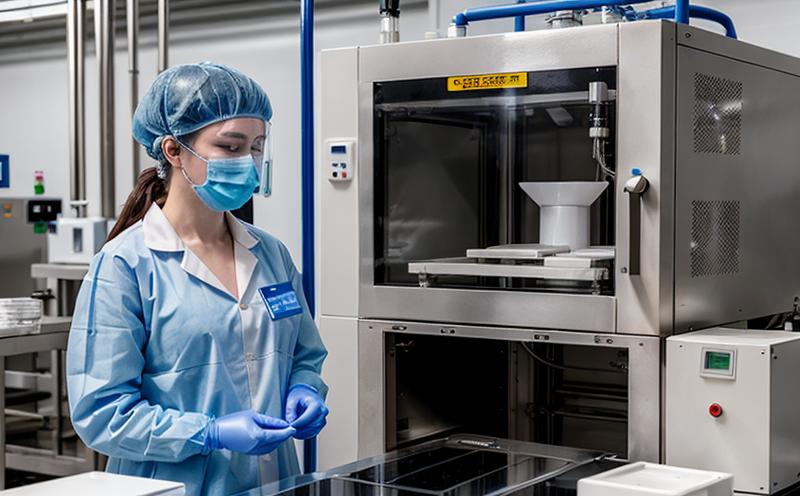GMP Rinse Water Residue Testing
Good Manufacturing Practice (GMP) compliance is a cornerstone of pharmaceutical manufacturing. Ensuring that all processes adhere to stringent quality standards, including proper rinse water residue levels, is critical for the production of safe and effective medicines. The Pharmaceutical sector relies heavily on rigorous testing to guarantee the absence or minimal presence of residues from cleaning agents, disinfectants, or other substances in the rinse water used during manufacturing.
The importance of this cannot be overstated. Residues in rinse water can contaminate subsequent batches, leading to potential health risks for consumers and non-compliance with regulatory requirements. GMP compliance testing ensures that rinse water is free from harmful contaminants or residues that could compromise the integrity of pharmaceutical products.
The testing process involves multiple steps. First, a sample of the rinse water must be collected under controlled conditions. This sample should represent typical usage to ensure accurate results. Once collected, the sample undergoes rigorous analysis using advanced instrumentation such as high-performance liquid chromatography (HPLC), inductively coupled plasma mass spectrometry (ICP-MS), or gas chromatography-mass spectrometry (GC-MS) depending on the suspected residues.
The acceptance criteria for GMP rinse water residue testing are stringent. They typically adhere to international standards such as ISO 14644 and USP . These standards dictate that no detectable levels of specific substances should be present in the rinse water, with limits often set at parts per million (ppm) or even parts per billion (ppb). The choice of acceptable residues is determined by the nature of the pharmaceutical product being manufactured.
For example, if a sterile injectable is being produced, any detectable level of a disinfectant could be problematic. Therefore, rinse water must meet strict criteria to ensure that all traces of such substances are removed. Similarly, for oral medications, while the risk may not be as immediate, residual cleaning agents can still affect product quality and shelf life.
Another critical aspect of this testing is ensuring the efficiency of the cleaning process itself. By regularly monitoring rinse water residues, manufacturers can identify inefficiencies in their cleaning protocols. This allows for timely adjustments to improve processes, reducing waste and potential contamination risks.
The process also involves regular calibration of instruments used in testing and adherence to standard operating procedures (SOPs). Compliance with these SOPs is crucial not only for accurate test results but also for ensuring that the entire manufacturing process remains consistent and reliable. This consistency is vital for maintaining high-quality standards across all batches produced.
Why It Matters
The significance of GMP rinse water residue testing extends beyond mere compliance with regulations; it plays a pivotal role in safeguarding public health and ensuring product quality. When residues from cleaning agents or disinfectants remain in the rinse water, they can contaminate subsequent batches of pharmaceutical products.
- Potential Health Risks: Residues like benzalkonium chloride used as a disinfectant in certain medical devices can pose risks if not completely removed. This contamination could lead to allergic reactions or other adverse effects when the final product is consumed or administered.
- Product Quality: Even trace amounts of cleaning agents can affect the purity and efficacy of drugs, potentially shortening their shelf life or reducing their effectiveness.
The impact of such residues extends to both the manufacturer and the regulatory bodies. Manufacturers risk fines, product recalls, and reputational damage if they fail to meet GMP standards. Regulatory bodies like the FDA (Food and Drug Administration) in the United States closely monitor these practices to ensure that only safe products reach consumers.
Applied Standards
The testing of rinse water for GMP compliance follows specific international standards designed to ensure consistency and accuracy across different laboratories worldwide. These standards provide a framework for collecting samples, performing analyses, and interpreting results.
- ISO 14644: This is the ISO standard on cleanroom classification, which includes guidelines that can be applied to ensure proper cleaning practices in pharmaceutical manufacturing facilities. It specifies criteria for maintaining air quality, which indirectly impacts the cleanliness of rinse water.
- USP : The United States Pharmacopeia provides specific requirements for compounding sterile products. This includes stringent guidelines on the use and removal of cleaning agents to prevent contamination.
The testing also adheres to other standards such as ICH Q5C, which focuses on Good Automated Manufacturing Practice (GAMP) for computerized systems in pharmaceutical manufacturing. While not directly related to rinse water residue testing, it ensures that the entire automated process is controlled and monitored effectively.
International Acceptance and Recognition
- The results of GMP rinse water residue tests are widely recognized and accepted across various countries. For instance, compliance with ISO standards ensures that the testing meets internationally accepted criteria.
- In the European Union (EU), adherence to EU directives on pharmaceutical manufacturing is crucial. The EU's Pharmacopeia provides detailed guidelines for ensuring that all stages of production meet stringent quality standards.
- The World Health Organization (WHO) also recommends compliance with these types of tests as part of its broader efforts to ensure the safety and efficacy of medications worldwide.





